

Brunel University Research Archive: Questioning Guanxi: Definition, Classification and Implications. Chinese social relations. Face (sociological concept) The term face idiomatically refers to one's own sense of dignity or prestige in social contexts.
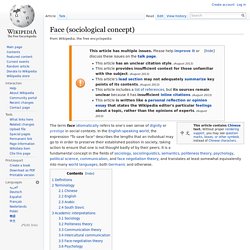
In the English-speaking world, the expression "To save face" describes the lengths that an individual may go to in order to preserve their established position in society, taking action to ensure that one is not thought badly of by their peers. It is a fundamental concept in the fields of sociology, sociolinguistics, semantics, politeness theory, psychology, political science, communication, and face negotiation theory, and translates at least somewhat equivalently into many world languages, both Germanic and otherwise.
Although Lin Yutang claimed "Face cannot be translated or defined",[1] compare these definitions: The term face may be defined as the positive social value a person effectively claims for himself by the line others assume he has taken during a particular contact. Ganqing. Gǎnqíng (Chinese: 感情; pinyin: gǎnqíng; Wade–Giles: kan-ch'ing) is an important concept in social relations in Chinese culture which is loosely translated as "feeling" and is related to the concept of guānxi (relationship network).
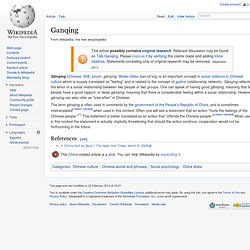
Gǎnqíng reflects the tenor of a social relationship between two people or two groups. One can speak of having good gǎnqíng, meaning that two people have a good rapport, or deep gǎnqíng, meaning that there is considerable feeling within a social relationship. GCiS China Services. China Characteristics - Regarding Guanxi "Guanxi" is the most overused term in the China business environment.
The term is central to doing business in China because the concept and practice of Guanxi is so central to the Chinese context. As the Chinese do consider Guanxi important, so the foreigners must learn, adapt and understand. The logical place to start is with a definition. Guanxi translated means 'relationships’. Guanxi is used to accomplish the specific ends or objectives of the people involved. Practically speaking, imagine a giant three-dimensional web that rolls across time and life circumstances.
Guanxi. For the autonomous region, see Guangxi.
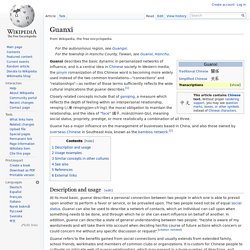
Guanxi describes the basic dynamic in personalized networks of influence, and is a central idea in Chinese society. In Western media, the pinyin romanization of this Chinese word is becoming more widely used instead of the two common translations—"connections" and "relationships"—as neither of those terms sufficiently reflects the wide cultural implications that guanxi describes.[1] Guanxi has a major influence on the management of businesses based in China, and also those owned by overseas Chinese in Southeast Asia, known as the bamboo network.[2] Description and usage[edit] At its most basic, guanxi describes a personal connection between two people in which one is able to prevail upon another to perform a favor or service, or be prevailed upon. Guanxi refers to the benefits gained from social connections and usually extends from extended family, school friends, workmates and members of common clubs or organizations.
Usage examples[edit] Guanxi @ Berkshire Publishing / FrontPage. How to Fight Guanxi. Guanxi is a major problem in Chinese education.
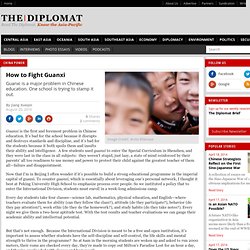
One school is trying to stamp it out. Guanxi is the first and foremost problem in Chinese education. It’s bad for the school because it disrupts and destroys standards and discipline, and it’s bad for the students because it both spoils them and insults their ability and intelligence. A few students used guanxi to enter the Special Curriculum in Shenzhen, and they were last in the class in all subjects: they weren’t stupid, just lazy, a state of mind reinforced by their parents’ all too readiness to use money and power to protect their child against the greatest teacher of them all—failure and disappointment.
Now that I’m in Beijing I often wonder if it’s possible to build a strong educational programme in the imperial capital of guanxi. Every day students take four classes—science lab, mathematics, physical education, and English—where teachers evaluate them for ability (can they follow the class?) But that’s not enough. Scientific study on Guanxi in Business. Professional Help for Importers of China Products December 9th, 2009 by China Business Success Stories First of all: please excuse us for not updating the site recently.
We decided it needed a make-over but we got stuck in trying to make up our mind about what to do. Where ‘Guanxi’ Rules. Yuanfen. Yuan (simplified Chinese: 缘; traditional Chinese: 緣) or Yuanfen (simplified Chinese: 缘分; traditional Chinese: 緣分; pinyin: yuánfèn; Vietnamese: duyên phận) is a Buddhist-related Chinese concept that means the predetermined principle that dictates a person's relationships and encounters such as the affinity among friends or lovers.
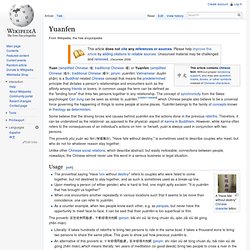
In common usage the term can be defined as the "binding force" that links two persons together in any relationship. The concept of synchronicity from the Swiss psychologist Carl Jung can be seen as similar to yuánfèn,[citation needed] which Chinese people also believe to be a universal force governing the happening of things to some people at some places. Yuánfèn belongs to the family of concepts known in theology as determinism. The proverb yǒu yuán wú fèn (有緣無份), "Have fate without destiny," is sometimes used to describe couples who meet, but who do not for whatever reason stay together.
Usage[edit] Translations[edit] See also[edit]